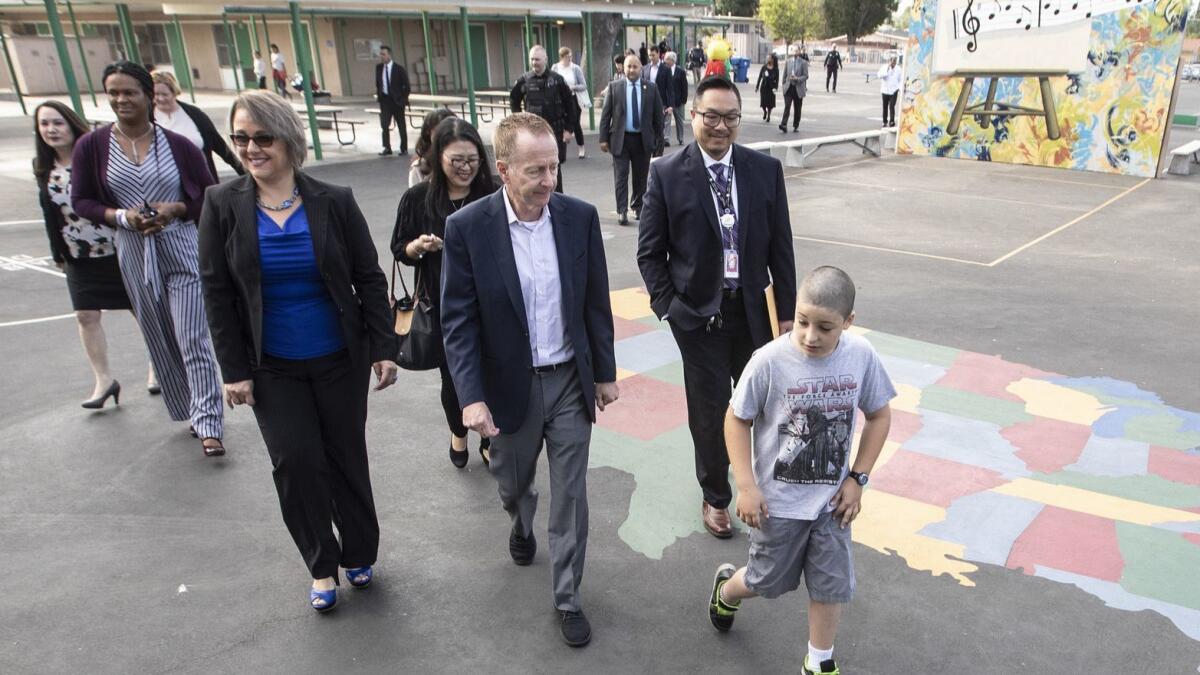Major resource infusion is in the works for 20 struggling L.A. schools

- Share via
Twenty struggling Los Angeles schools will get a mega-infusion of resources in an aggressive, experimental effort to show that L.A. Unified — if properly funded — can boost student achievement, L.A. schools Supt. Austin Beutner announced on Tuesday.
The effort, tentatively called Project 2020, seeks to raise standardized test scores in reading and math by 20 percentage points at each of 20 elementary schools within two years, a challenging statistical jump, based on typical school performance.
During a talk at UCLA, Beutner also presented other elements of his core long-term plans for improving the nation’s second-largest school system, where achievement trails state averages and large gaps separate the performance of white and Asian students from black and Latino students. A large gap also separates students from low-income families and those better off. Overall, about 44% of district students test as proficient in English and about 34% in math.
The superintendent highlighted his ongoing project to decentralize — which aims to organize groups of schools within geographic communities, such as Boyle Heights. He also said the district should focus more intensely on early education, increase professional development opportunities aimed at retaining teachers, and expand programs that develop fully bilingual students.
Beutner also intends to revamp the training of aspiring principals. At present, he said, their preparation concentrates too much on how to comply with district procedures. He wants fledgling principals to spend an entire semester shadowing a highly regarded principal. And he wants their training to include community organizing.
But nothing would showcase his efforts more than Project 2020, which envisions placing an extra teacher in every early-grade class to focus on reading and on installing a more engaging math program that is based on recommendations from district teachers.
Although Beutner hasn’t yet selected the schools or set a funding level, he sees the effort as a way to bust through the “seduction of incrementalism,” he said during a discussion with UCLA education professor Pedro Noguera before an audience of invited guests.
“What do we know would work to see a 20-point literacy gain?” Beutner said. “Well, this is it. So it’s going to be intensive focus.... If we’re not accelerating the pace of progress, we’re not helping students who are here today, tomorrow, in our schools, and we have to do better.”
District officials also would arrange for outside help at 2020 schools, such as county-funded mental health services to provide social and emotional support, an essential underpinning for academic progress, Beutner said. The city, for its part, should provide support for homeless families, using the campus as a focal point, he added.
“It’s going to take all of us,” the superintendent said. “So the county has to join this party. The city has to join this party. The state has to join this party.”
Beutner frequently notes that L.A. Unified receives about $17,000 per student, compared with about $30,000 in New York City. That differential, over a child’s entire education, would pay the cost of individual reading support for every child, he’s asserted. Now, he hopes to prove how much such funding would help the district’s most challenged students.
“We’re going to concentrate dollars in our highest-needs schools serving our highest-needs students to show we can do it, and we’re confident it’s going to work,” he said in a later interview with The Times. “That will be the proof point to advocate for more, to be able to do it in more schools.”
There are schools that have achieved such gains, but it isn’t easy, said Morgan Polikoff, an associate professor at USC’s Rossier School of Education. “It likely requires new resources, more instructional time for students, high-quality curriculum and curriculum implementation, a coherent school vision for improvement and stability of staff — among other things.”
“Experience tells us that shifts of this magnitude take time, generally more than two years, particularly in schools that have struggled for years,” said Julie Marsh, professor of education policy at Rossier.
The Board of Education will have an opportunity to weigh in during the budget-approval process.
School board member Nick Melvoin, who attended the event, said he’s encouraged by what he heard. All the same, he’d like to see Beutner’s vision presented in a formal strategic plan, especially given that the superintendent has been on the job more than 18 months.
“If you have 100 priorities, you have no priorities,” he said in an interview. “You need to focus.” A strategic plan also would set out benchmarks, timelines and accountability measures. “This is how we’re going to know if we’re successful.”
Beutner’s strategy echoes past efforts, including several to decentralize and a “Ten Schools Plan,” which provided an extra million dollars per year for a group of elementary campuses starting in 1987. Over the next decade, student achievement at these schools significantly surpassed those of similar nearby schools but still fell well short of national averages. Academic gains, as measured by test scores, generally faded out as students got older.
Beutner said Tuesday that previous efforts yielded disappointing results because of a lack of long-term commitment and follow through.
More to Read
Sign up for Essential California
The most important California stories and recommendations in your inbox every morning.
You may occasionally receive promotional content from the Los Angeles Times.











